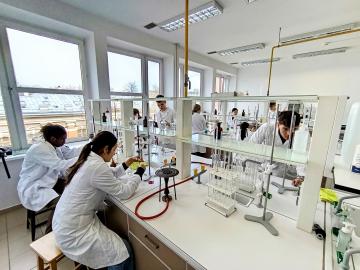Environment Protection Engineering
M.Sc. Environment Protection Engineering
Faculty of Environmental Engineering
Duration: 2 years
Starts in: October & February
The graduate programme in Environment Protection Engineering lasts four semesters and leads to a Master of Science in Engineering (MSc Eng) Degree. The whole programme comprises 1400 hours and 124 ECTS credits. It focuses on research and engineering activities that aim at mitigating the negative impacts of human activity on the environment. It is primarily addressed to the alumni of the undergraduate programme in environmental engineering or other undergraduate engineering programmes, such as civil, mechanical or chemical engineering.
The programme's first year gives in-depth knowledge in computational methods, environmental fluid mechanics, chemistry, scientific programming, data analysis, and management. Moreover, several specialized engineering courses cover specific topics within the field of environment protection engineering. The main topics are as follows: environmental protection management, surface and groundwater protection, soil diagnostic techniques, monitoring of the environment, applied climatology and global climate change, and municipal solid waste treatment technologies. In the second year, further courses in environment protection engineering are offered: land reclamation and development, irrigation and drainage, remote sensing of environment, pro-ecological technologies, energy systems modelling and optimisation. Some elective courses supplement these compulsory courses.
Moreover, in the third and fourth semesters, students work on the final project and prepare a master thesis on a proposed topic. The completed Master’s Thesis should demonstrate acquired scientific and technical skills and understanding of environmental issues. The thesis is presented for review, assessment and examination by the Faculty Examination Board. The master thesis is credited with 20 ECTS points.
Graduate Profile:
The undergraduate programme in Environmental Engineering aims at a general engineering practice related to protecting the environment and sustainable development. Students are trained for positions as consulting engineers, environmental affairs engineers for industrial and transportation companies, land reclamation and waste management companies, water and sewer companies, engineering design studios and consulting companies, civil servants in national, regional and local environmental agencies and services, environmental inspection and monitoring units.
At the Masters’s level, the programme in Environment Protection Engineering aims at research and engineering activities concerning the mitigating of negative impacts of human activity on the environment. Graduates receiving the Master of Science in Engineering degree will be able to develop their individual/independent professional practices, carry out an environmental impact assessment, design and execute or supervise environment protection measures in companies, maintain monitoring networks and provide expertise to local and regional authorities for decision making.
In 2018 both our programmes in Environmental Engineering, BSc and MSc were accredited by the Accreditation Commission of Universities of Technology and received the EURO-ACE® label which means that the programmes satisfy ENAEE standards specified in the EUR-ACE Standards and Guidelines for Accreditations of Engineering Programmes. EUR-ACE is the European quality label for engineering degree programmes at Bachelor’s and Master’s levels and gives international value and recognition to that engineering qualifications.
ENAEE (European Network for Engineering Accreditation) is the European body responsible for awarding authorisation to accreditation agencies to award the EUR-ACE® label at Bachelor’s and Master’s levels to engineering programmes that they have accredited


